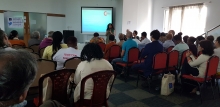4th Peoples Health Assembly held in Bangladesh

Convened in the year marking the 40th anniversary of the Alma-Ata Declaration, the 4th People's Health Assembly provided a unique space to analyse global health, share experiences, mutual learning and jointly strategize for future actions towards winning Health for All. The Alma-Ata Declaration for today’s world was critically discussed during several sessions.
Factoring in shared experiences and the realities from different regions of the world, making comparative analysis of Comprehensive Primary Health Care (CPHC) and other global initiatives such as the SDGs 3 and 5 aimed at tackling the health needs of the world, and considering the available statistics, the Assembly acknowledged the level of progress made over the last four decades towards the attainment of Health for All.
However, PHA-4 observed with dismay the slow pace at which these gains are made at the expense of millions who die of preventable conditions, especially in low and middle income countries, while policymakers forge selective healthcare plans under neoliberal schemes that exacerbate inequality and do not conform to the principle of Primary Health Care - the availability of quality health care that is accessible and affordable to all.
On the contrary, it was observed that healthcare is increasingly becoming expensive and inaccessible as healthcare provision is gravitating more towards privatization than as a public service. The threat on Obamacare in the USA is a classic example. The intentional underfunding of public health systems in low- and middle-income countries has become a norm simply to render those systems as not workable, as a means to justify their privatisation.
Carefully analysing the statistics, participants clearly pointed out the divide between the rich and the poor and indicated how directly proportional wealth is to health. For example, around the world, under-five mortality rates dropped by 47% from 78 deaths per 1,000 live births to 41 deaths per 1,000 live births during the period 2000 to 2016.
Even so, 5.6 million children under-five died in 2016 as documented in the Global Strategy for Women's Children's and Adolescents' Health (2016-2030). Regrettably, the Global Health Observatory (GHO) data reported that 46% (2.6 million) of those deaths were neonatal (occurred in the first 28 days of life i.e. 7,000 newborn deaths each day of their first week of life!) The statistics indicates children in poor communities to be more vulnerable. Worse of all, 60 countries will not meet the neonatal mortality SDG target by 2030, if there is no change in the current course of affairs.
In the same vein, maternal mortality has decreased by 37% from 2000 to 2015. However, about 303,000 maternal mortalities were recorded globally in 2015 alone. Sadly, the majority of these deaths were due to preventable conditions. It was also recorded that maternal mortality is the major cause of death of teenage girls between 15 and 19 years of age.
It is especially alarming to note that amidst all the progress made thus far, in developing countries, it is reported that only half of women have received the healthcare they need, and family planning needs are increasing in double digits with population growth, while 225 million women who need family planning are yet to gain access.
All of the above show that something is terribly wrong with the way in which the issue of health is being handled in our world today. But more troubling still is the fact that researchers believe if we continue with the current status quo, it will take 250 years to achieve Health for All!
The world cannot wait that long to stop the preventable death of women and children in their hundreds of thousands and millions annually, especially when we already have a healthcare delivery model which started off forty years ago. Delegates at the assembly reasoned that if health is, indeed, a basic human right, it should be given the Alma-Ata Declaration’s redress which makes it available, accessible, affordable and of quality to all.
The five-day cordial interaction of members from the global community was thought provoking, educative, objective and demonstrated togetherness in the advocacy for Health for All. The assembly calls for the return to Comprehensive Primary Health Care as prescribed in the Alma-Ata Declaration, an end to the privatisation of health services, increased budgetary support to health care by governments, donors and other partners and the setting up of mechanisms of accountability in the health systems.
The People`s Health Movement and its allies, including PSI, recommitted themselves to the cause of a more robust advocacy for Health for All in the coming years and tasked themselves with the objective of expanding human rights-based health campaigning networks to more individuals, groups and countries.
George Poe Williams is the General Secretary of the National Health Workers’ Union of Liberia (NAHWUL)

